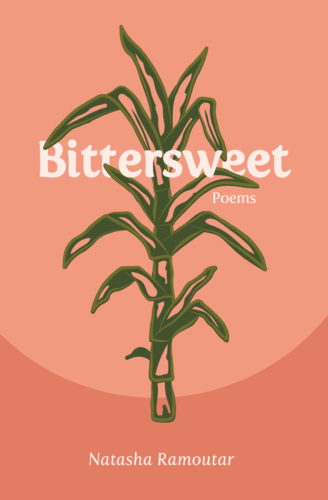From her Scarborough home, Ryerson grad Natasha Ramoutar tells CJRU about her first book, Bittersweet. She breaks down the complex feelings and histories that shape her collection of poems.
“It covers a disrupted or suppressed lineage. For me, Bittersweet is about connecting the home I have right now in Scarborough with my ancestral home and what happens when you don’t have links or certain historical documents,” the Toronto-born writer explains.
Ramoutar's parents were born in Guyana, a country situated on the Northern mainland of South America with cultural ties to the Caribbean. Like many Indo-Caribbeans, they are descendants of Indian indentured labourers. With the abolition of slavery in the 1830s, there was a shortage of labour which was previously done by enslaved African people. The indentured labour system became one of the substitutes in British colonies like Guyana. South Asian people were exploited for labour at incredibly low wages and it led to the migration of millions. This practice of bonded labour was outlawed by the Universal Declaration of Human Rights adopted by the UN General Assembly in 1948 but Ramoutar notes that the practice of bonded labour still exists around the world. In her work, Natasha explores the impacts and patterns of colonialism and how they take shape in our lives and identities as Canadians. She looks at the impact that these multiple migrations have on her sense of self today.
Ramoutar explores a lack of cross-cultural and intergenerational communication, transnational migration, and the concept of homeland. Many of the poems in Bittersweet trace back to Scarborough and exist in conversation with other artists in the area. Throughout the book, there are nods to Noor Khan’s film EAST: A Relationship, Kevin A’s album “Tropic” and Adrian De Leon’s poetry collection “Rouge.”

Image courtesy of Natasha Ramoutar
In our conversation, Ramoutar explains the origin of phrases like “exiled from birth” in her poem “Us Diaspora Babies, We Do Not Sleep.” How trips back to Guyana shape her identity, and why the diaspora may be asking for too much from their ancestral homelands. She is hoping to see more of these stories of migration in Canadian literature. She also hopes for a more multi-dimensional depiction of Scarborough in the media, rather than narrowing it down to a place of violence or exotizisation resulting from its racialized population. She mentions David Chariandy and Katherine Hernandez as writers paving the way for these stories. And through her collective FEEL WAYS, she is adding to this change herself.
“Even when I was studying post-colonial literature in school, the kind of stories I was seeing were … what it means to just touch down here, what it means to experience your first snow fall. All those stories are definitely important but I think with these new generations, there’s a new set of issues that people are grappling with. I’m seeing that come out in newer work," she adds.
Hear more from Natasha Ramoutar in the interview below:
Order her book Bittersweet on the Mawenzi House website.


